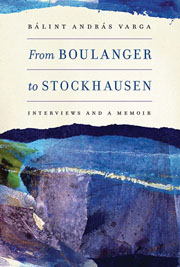Foreword
Published online by Cambridge University Press: 05 January 2014
Summary
After I'd finished reading Bálint András Varga's text, I dug out the copy of Schoenberg's Sechs kleine Klavierstücke (Universal Edition, 1913) that I'd bought as a schoolboy in 1953. At that distant time, the bold capitals and wide spaces on the front cover and the seven challengingly complex yet startlingly economical pages of music within stood for just about everything that was not central to mid-century musical life and education in my part of the world. Sadly, I failed to make it as a composer of music worthy to follow on from Schoenberg (and therefore to be published by Universal Edition), turning instead to academic, analytical exposition and explanation. But the sense of awe and excitement that came from that particular purchase and from the process of learning to play and think about those pieces has never diminished.
Such a frankly confessional tone is not normally the métier of the musicologist, still less of the music theorist. But this book is both frankly confessional and unusually illuminating about a musical life, in ways refreshingly different from what academic musicology can offer. During its author's time—the second half of the twentieth century and first part of the twenty-first—classical music has survived, despite the explosion of activity and interest in various kinds of commercial, popular, and ethnic musics, developed by artists who view creation and composition very differently from the composers Schoenberg admired, or the composers he taught; yet most of what has survived of classical music is to be found in concerts, recordings, and scholarly studies that give pride of place to compositions from earlier times.
- Type
- Chapter
- Information
- From Boulanger to StockhausenInterviews and a Memoir, pp. ix - xPublisher: Boydell & BrewerPrint publication year: 2013



